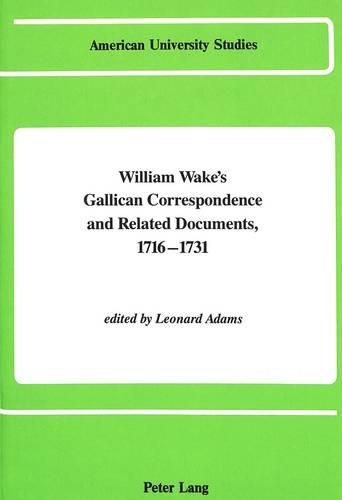Readings Newsletter
Become a Readings Member to make your shopping experience even easier.
Sign in or sign up for free!
You’re not far away from qualifying for FREE standard shipping within Australia
You’ve qualified for FREE standard shipping within Australia
The cart is loading…






The accession of William Wake (1657-1737) to the primacy of Great Britain in 1716 was hailed by Protestants all over Europe. Lutheran and Reformed theologians came to see Wake not only as the wisest choice the Anglican Church could have made but also as another great apostle of Christian unity. Gallican and Jansenist theologians also were impressed by Wake’s interest in ecumenical discussions. Their dissatisfaction with factional disputes within the Church in France and their consequent openness to the Anglican view of church history and basic theology are reflected in this critical edition of more than a thousand letters exchanged with Wake over a period of fifteen years. But this was an age when letters were probably the most reliable source of current news. It is therefore not surprising that they reflect an era in the social, economic, political and religious life of Western Europe deeply marked by controversy; for this was also the age of Voltaire, Montesquieu, Ellies Dupin and Pierre-Francois Le Courayer, the embattled librarian of the abbey of Sainte-Genevieve.
$9.00 standard shipping within Australia
FREE standard shipping within Australia for orders over $100.00
Express & International shipping calculated at checkout
The accession of William Wake (1657-1737) to the primacy of Great Britain in 1716 was hailed by Protestants all over Europe. Lutheran and Reformed theologians came to see Wake not only as the wisest choice the Anglican Church could have made but also as another great apostle of Christian unity. Gallican and Jansenist theologians also were impressed by Wake’s interest in ecumenical discussions. Their dissatisfaction with factional disputes within the Church in France and their consequent openness to the Anglican view of church history and basic theology are reflected in this critical edition of more than a thousand letters exchanged with Wake over a period of fifteen years. But this was an age when letters were probably the most reliable source of current news. It is therefore not surprising that they reflect an era in the social, economic, political and religious life of Western Europe deeply marked by controversy; for this was also the age of Voltaire, Montesquieu, Ellies Dupin and Pierre-Francois Le Courayer, the embattled librarian of the abbey of Sainte-Genevieve.